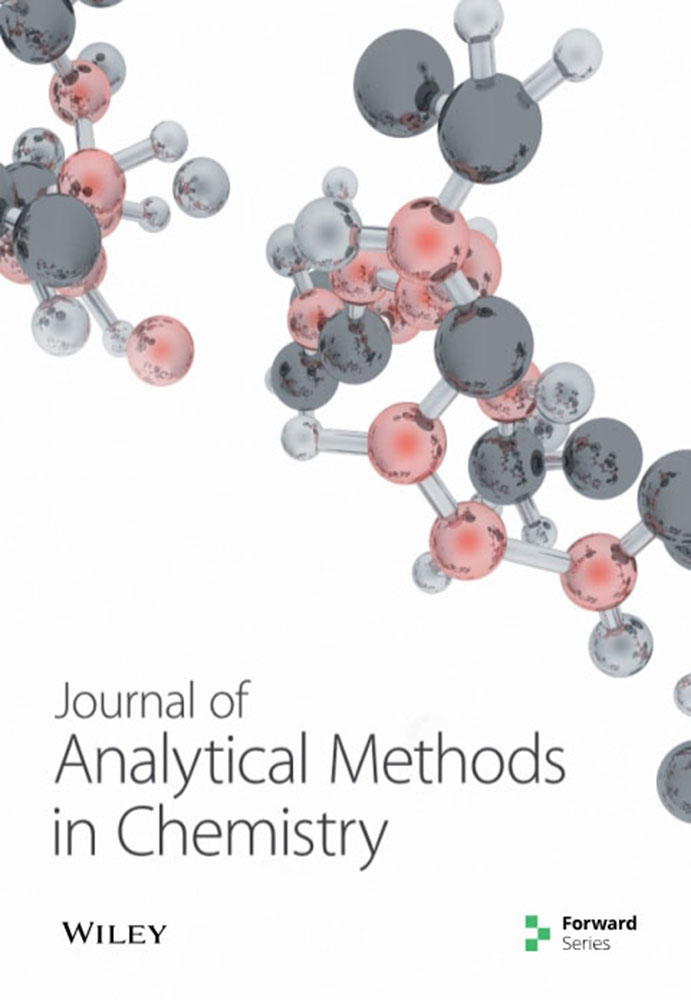A Simple and Sensitive HPLC-MS/MS Assay for the Quantitation of Blonanserin and N-Desethyl Blonanserin in Rat Plasma and Its Application to Pharmacokinetic Study
IF 2.3
3区 化学
Q3 CHEMISTRY, ANALYTICAL
引用次数: 0
Abstract
A high-performance liquid chromatographic method coupled with triple quadrupole mass spectrometry (LC-MS/MS) for the analysis of blonanserin and its active metabolite, N-desethyl blonanserin, in rat plasma has been developed and validated. The biological samples were treated by simple direct protein precipitation before separation on an Agilent Eclipse Plus C18 column (4.6 × 100 mm, 3.5 μm) with a column temperature of 35°C at a flow rate of 0.5 mL/min. The mobile phase A is a mixture of methanol and water (75 : 25, v/v, 5 mM ammonium formate), and the mobile phase B is acetonitrile containing 0.1% formic acid. The ratio of mobile phase A to mobile phase B is 15 : 85. Electrospray ionization (ESI) multiple reaction monitoring modes are used for detection, which are m/z 368.10 ⟶ 296.90 (blonanserin), m/z 340.15 ⟶ 297.05(N-desethyl blonanserin), and m/z 348.15⟶ 302.05 (N-desethyl blonanserin-d8). The linear response range was 0.1–100.0 ng/mL for blonanserin and N-desethyl blonanserin. The lower limit of quantification (LLOQ), calibration curves, carryover, and matrix effects were sufficiently accurate and precise according to the National Medical Products Administration (NMPA) guidelines for bioanalytical method validation. This analytical method was successfully applied in a blonanserin-poloxamer thermosensitive gel pharmacokinetic study in rats.高效液相色谱-质谱联用法测定大鼠血浆中勃隆霉素和n -去乙基勃隆霉素及其药动学研究
建立了一种高效液相色谱-三重四极杆质谱联用(LC-MS/MS)分析大鼠血浆中blonanserin及其活性代谢物n -去乙基blonanserin的方法并进行了验证。分离前,生物样品在Agilent Eclipse Plus C18色谱柱(4.6 × 100 mm, 3.5 μm)上进行简单直接蛋白沉淀处理,柱温为35℃,流速为0.5 mL/min。流动相A为甲醇与水(75:25,v/v, 5mm甲酸铵)的混合物,流动相B为含0.1%甲酸的乙腈。流动相A与流动相B的比例为15:85。采用电喷雾电离(ESI)多反应监测模式进行检测,分别为m/z 368.10 - 296.90 (blonanserin)、m/z 340.15 - 297.05(n-去乙基blonanserin-d8)和m/z 348.15 - 302.05 (n-去乙基blonanserin-d8)。blonanserin和n -去乙基blonanserin的线性响应范围为0.1 ~ 100.0 ng/mL。根据国家药品监督管理局(NMPA)生物分析方法验证指南,定量下限(LLOQ)、校准曲线、结转和基质效应足够准确和精确。该方法成功地应用于勃隆那色林-波洛沙姆热敏凝胶在大鼠体内的药动学研究。
本文章由计算机程序翻译,如有差异,请以英文原文为准。
求助全文
约1分钟内获得全文
求助全文
来源期刊

Journal of Analytical Methods in Chemistry
CHEMISTRY, ANALYTICAL-ENGINEERING, CIVIL
CiteScore
4.80
自引率
3.80%
发文量
79
审稿时长
6-12 weeks
期刊介绍:
Journal of Analytical Methods in Chemistry publishes papers reporting methods and instrumentation for chemical analysis, and their application to real-world problems. Articles may be either practical or theoretical.
Subject areas include (but are by no means limited to):
Separation
Spectroscopy
Mass spectrometry
Chromatography
Analytical Sample Preparation
Electrochemical analysis
Hyphenated techniques
Data processing
As well as original research, Journal of Analytical Methods in Chemistry also publishes focused review articles that examine the state of the art, identify emerging trends, and suggest future directions for developing fields.
 求助内容:
求助内容: 应助结果提醒方式:
应助结果提醒方式:


